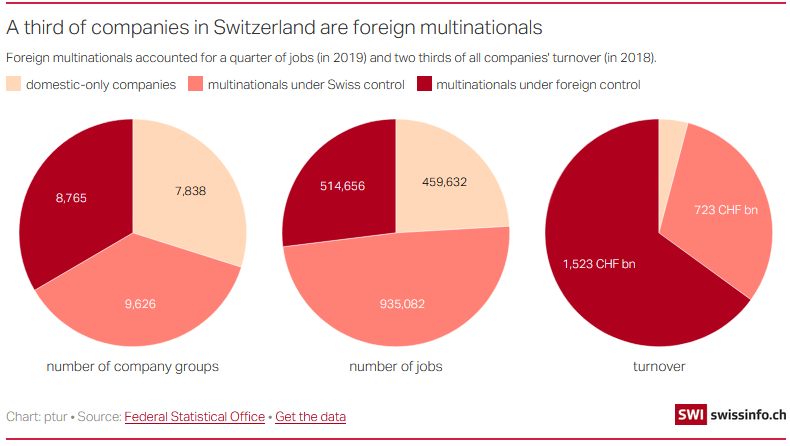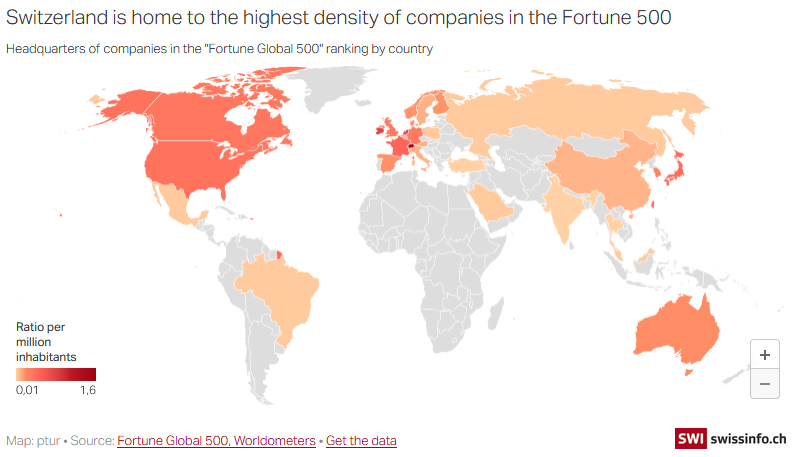Switzerland may have to find alternative ways to welcome foreign companies to Switzerland. Keystone / Peter Klaunzer The looming shadow of a global minimum corporate tax rate could threaten Switzerland’s status as a hub for multinational company headquarters. The United States says that no country should tax companies less than 21%, a proposal that has added momentum to talks over a worldwide minimum corporate tax rate. The average corporate tax rate among Swiss cantons currently stands at around 15%, according to KPMG. “I can imagine a 21% tax rate would deter foreign investment coming into Switzerland,” Swiss Business Federation (economiesuisse) tax expert Frank Marty told SWI swissinfo.ch. “Switzerland is a small nation with few natural resources and no links
Topics:
Matthew Allen considers the following as important: 3.) Swissinfo Business and Economy, 3) Swiss Markets and News, Featured, newsletter, Politics
This could be interesting, too:
Investec writes The Swiss houses that must be demolished
Claudio Grass writes The Case Against Fordism
Nachrichten Ticker - www.finanzen.ch writes Die Performance der Kryptowährungen in KW 9: Das hat sich bei Bitcoin, Ether & Co. getan
Nachrichten Ticker - www.finanzen.ch writes Wer verbirgt sich hinter der Ethereum-Technologie?

Switzerland may have to find alternative ways to welcome foreign companies to Switzerland. Keystone / Peter Klaunzer
The looming shadow of a global minimum corporate tax rate could threaten Switzerland’s status as a hub for multinational company headquarters.
The United States says that no country should tax companies less than 21%, a proposal that has added momentum to talks over a worldwide minimum corporate tax rate. The average corporate tax rate among Swiss cantons currently stands at around 15%, according to KPMG.
“I can imagine a 21% tax rate would deter foreign investment coming into Switzerland,” Swiss Business Federation (economiesuisse) tax expert Frank Marty told SWI swissinfo.ch. “Switzerland is a small nation with few natural resources and no links to the ocean. Smaller countries should have the right to use the assets that they have – and tax is fundamental.”
The idea of taxing companies at a global minimum rate has been around for a few years but recently found renewed impetus at the Organisation for Economic Co-operation and Development (OECD) and the G20 group of powerful economies.
The talks being held by the G20 and OECD also propose measures to make companies pay taxes where they generate their sales and not just where they are located. The potential impact of these measures is hard to gauge as the details have yet to be hammered out. But it’s clear that Switzerland could lose tax revenue from the likes of Nestlé and Roche, which generate most of their sales and profits abroad.
Marty believes that a minimum tax rate could be agreed upon at the G20 /OECD level by the end of the year. He urges Switzerland to fight for a minimum rate of no higher than 15%.
Switzerland has so far called for “simple, clear and moderate solutionsExternal link”. Finance Minister Ueli Maurer says he is willing to discuss reforms, despite warning two years ago that the OECD’s proposals could cost the Swiss economy up to CHF5 billion ($5.5 billion).
In reality, Switzerland would have no option but to comply should there be global consensus on how to tax companies in future. “So far, no major economy has spoken out against a minimum rate of corporation tax,” said KPMG Switzerland’s Peter Uebelhart. The proposed minimum tax rate would apply to a company’s overseas profits.
But if a country taxes these profits at a rate lower than the minimum threshold, the firm’s home government could levy a charge to top up the taxes to the minimum rate – eliminating any tax advantage from the tax haven.
The tax consultancy group recommends that Switzerland spend more on enhancing its infrastructure for companies as the only reasonable way to keep the country attractive to multinational firms.
Losing an edgeAt the end of 2019, some 8,765 foreign company groups had a base in Switzerland, supporting more than half a million jobs. They generated twice the turnover of domestic multinational companies in Switzerland. There are already signs that Switzerland is losing its edge in the competition to attract multinational operations. In 2019, consultancy firm McKinsey warned that other countries are pulling ahead. In recent years, Switzerland has been forced to reform its corporate tax code that favoured foreign holding companies and has voted to restrict the influx of European Union workers. Switzerland’s high standard of living, neutrality and network of universities are a magnet for companies and workers from abroad. But strained relations with the EU threaten restricted access to the European bloc. |
A third of companies in Switzerland are foreign multinationals |
‘Already an expensive country’An enforced hike in corporate levies would also reduce scope to offset the high costs of labour and office rents in Switzerland with low taxes. “We are already an expensive country,” says Martin Naville, CEO of the Swiss-American Chamber of Commerce. “If you add expensive taxes on top, it would not be good for Switzerland. I don’t see an exodus of companies already established here, but we would see fewer new arrivals.” |
Switzerland is home to the highest density of companies in the Fortune 500 |
US Treasury Secretary Janet Yellen is at the focus of the drive to bring those tax rates up. “America will compete on our ability to produce talented workers, cutting-edge research and state-of-the-art infrastructure—not on whether we can have lower tax rates than Bermuda or Switzerland,” she said in a recent editorial in the Wall Street JournalExternal link. “Destructive tax competition will only end when enough major economies stop undercutting one another and agree to a global minimum tax.”
Naville says Yellen has “failed to do her homework”. He maintains that Switzerland no longer employs tax tricks to artificially bring rates down even further.
He blames US enthusiasm for corporate tax reform on the trillions of dollars being spent on revitalising a Covid-ravaged economy. This will require extra tax receipts to pay back. If the US starts taxing firms more heavily, it “has to get everyone else to raise their taxes or US companies will be at a disadvantage“.
Such arguments fall on deaf ears at the Swiss NGO Public Eye, which campaigns against multinationals and powerful countries sucking taxes out of smaller states.
“It is extremely encouraging that discussions on minimum tax rates are gathering speed,” said spokesman Andreas Missbach.
“It is very possible that Switzerland will pay the price for a strategy built on attracting companies with fiscal privilege. But Switzerland should have known that the practice of poaching income from other countries could not last forever.”
Tags: Featured,newsletter,Politics










